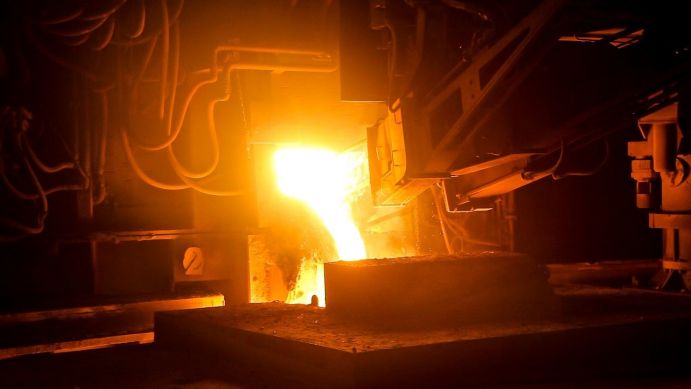KlimPro-Industrie – Avoiding climate-damaging process emissions in industry
In the basic materials industry, such as steel and iron production or the cement industry, high quantities of greenhouse gases are emitted as a result of the processes involved. Innovative technologies and processes should significantly reduce these emissions.

In its climate protection plan, the German government has set itself the goal of achieving greenhouse gas neutrality by 2045. German industry must make an important contribution to this. After all, with around 24 percent of greenhouse gas emissions, it is the second largest emitter in Germany.
In sectors of the basic materials industry, such as steel and iron production, the cement industry or the chemical industry, process-related greenhouse gas emissions are virtually unavoidable according to the current state of technology. These so-called "direct" emissions of climate-relevant gases are to be avoided as far as possible in future with the help of innovative technologies and processes, so that the production of important raw materials in Germany can become CO2-neutral. In order to achieve this, the German Federal Ministry of Research, Technology and Space (BMFTR) is funding innovative processes in this sector with the KlimPro-Industrie measure. The aim is to reduce greenhouse gases significantly beyond the gradual improvement of existing processes. This means that the most frequently released greenhouse gas, carbon dioxide (CO2), is to be avoided as much as possible - based on so-called Carbon Direct Avoidance (CDA) approaches. If these approaches cannot be fully implemented in practice, there are also options for capturing CO2 that is still being produced and recycling it (Carbon Capture and Use, CCU) or storing it permanently (Carbon Capture and Storage, CCS). In this way, KlimPro-Industrie contributes to maintaining the economic success and competitiveness of German industry, even under the conditions of an ambitious climate protection policy.
This requires new approaches from application-oriented research. In the funded projects of the current research phase, there is a particular focus on the implementation potential so that the researched processes can have a sustainable impact on the climate. This concerns their usability, the required infrastructure and their economic viability in competition. In the projects, the concrete utilization potential of the respective technology is to be worked out, thus fulfilling an important prerequisite for its further development to application maturity in industry. Quantifying the climate protection impact of the technologies is part of each individual project as well as the funding measure as a whole.
The KlimPro-Industrie funding measure contributes to the BMFTR's High-Tech Agenda Germany by promoting innovative technologies for decarbonising industry. It supports researchers in designing, developing and advancing approaches and solutions for the climate-friendly transformation of industry.
KlimPro-Industrie Phase II – further development and continuation of KlimPro research
The Ministry will provide additional funding for KlimPro-Industrie II in future and will support research projects in all sectors of the basic materials industry. This will address further research needs in a focussed manner, including in the following areas:
- Electrification and conversion to hydrogen as a fuel for providing heat in industrial processes,
- Development of fossil-free carbon sources, including through the use of biomass,
- Increasing the energy efficiency of innovative process approaches,
- Linking the value chains of different industries.
With regard to the industries mentioned, there is potential in the secondary production of aluminium and other non-ferrous metals such as copper, for example, as well as in the casting of smelted products made from them. In the mineral processing industry, a significant contribution to greenhouse gas reduction can be made by providing the necessary process heat using alternative energy sources such as hydrogen or biomass fuels. In the chemical industry, carbon can be replaced in the future by mechanical and chemical recycling, biogenic sources or CO2. These options for replacing crude oil and natural gas can help to decarbonise the chemical industry and pave the way for climate neutrality.
KlimPro-Industrie – Phase I
The 19 research projects in the first phase of KlimPro-Industrie are investigating different methods and developing new processes to reduce greenhouse gas emissions in the chemicals, refractory products, gas and non-ferrous metals, glass, ceramics, steel and cement industries. The research topics are wide-ranging and include alternatives for heating glass melting tanks, the use of alternative raw materials for cement production and the development of innovative products, including the manufacturing process for increasing the energy efficiency of industrial furnaces. In addition to the research projects, the networking and transfer project "ReInvent" supports the BMFTR funding programme KlimPro-Industrie. The accompanying project offers networking opportunities for the research projects among themselves and with their environment. Professional transfer support and public relations work by the accompanying project offer the research projects important added value and strengthen the overall effectiveness of the funding programme. The BMFTR is investing a total of around 30 million euros in the projects in the first phase of KlimPro-Industrie.
News about the measure
Last updated on



